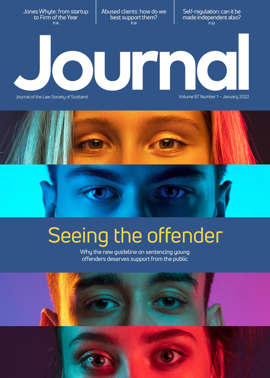A trauma-informed guideline

Iain Smith (of Keegan Smith) writes:
I have had the pleasure of knowing Kirsty Giles, an integrated psychotherapist who specialises in trauma, for a few years now. Over the past 12 months, she has joined forces with some lawyers including myself, Melissa Rutherford, Tony Bone and Nadine Martin, as well as colleagues James Docherty, project lead at the Violence Reduction Unit, BAFTA winning filmmaker Stephen Bennett, and educator Douglas Clark to form the Trauma Aware Law Group.
Together we decided to ensure that trauma-informed practice was embedded with law students to promote an early understanding and create a more compassionate and understanding legal system in the future. To that end, we spoke to every law school in Scotland, with a huge turnout and a positive response. Some universities have now added trauma awareness to their curriculum. The group have also delivered the Law Society of Scotland’s inaugural Trauma Accredited Law course, with plans to expand the course in 2022.
The highlight of 2021 took place in November, when the High Court approved the Scottish Sentencing Council Guideline on Young People, which the Trauma Aware Law Group hope will create a system change and a smarter approach to understanding and addressing traumatised folk who float into the justice system. The group, in association with the Law Society of Scotland, are providing a free talk on 20 January 2022 (see the Society’s CPD page) on why all lawyers and judges need to gain knowledge of trauma and, more importantly, how we all respond. The new guideline obliges lawyers and judges to see properly who is before the court, and prioritise repair and rehabilitation ahead of retribution and punishment.
Traumatised folk can’t be punished out of their pain or addiction, but they can be helped and healed.
Kirsty Giles writes:
The science is clear and the evidence is unavoidable. Adverse childhood experiences (ACEs) are the strongest predictor for an individual to become involved in crime, as a victim, as a perpetrator, or often both. What have ACEs got to do with justice? Read the paper at this link: bit.ly/3Jijj2j to find out that the answer is, everything.
Now that we know about the incredibly detrimental impact adverse childhood experiences can have on a young person’s life trajectory, what do we do with this knowledge?
We turn it into practice.
Understanding the biology and science of toxic stress and how it affects the developing brain is an excellent start, but what does this mean in a courtroom? What does it mean for the criminal justice system? How do we use it to influence and guide us when our job is to make Scotland safer?
We’ve heard of “presiding with kindness”, but what does that actually mean? Kindness and criminal justice in the same sentence is a fairly new concept. As a children and young person psychotherapist, these words are easy to say, and the science is relatively easy to understand, but putting it into practice is where the work truly begins.
We all have a responsibility to become curious about trauma-informed practice. Please seek out this new knowledge and way of working in order to make Scotland safer by reducing reoffending rates, stopping the revolving door of prison, and supporting people with substance misuse difficulties which are only exacerbated in the prison setting.
Our small but mighty group, Trauma Aware Law, seek to help you in your curiosity. We can provide training and awareness sessions on trauma-responsive practice: the “how to” of learning.
We are all on the same page here; we want safer streets and a safer country for our children and families and we also want to help people to heal.
If we have learned anything from the ACEs study and the incredible movement across Scotland to understand this information and how it impacts on people’s lives, I’d like us to remember this:
Hurt people hurt people, but healed people heal people. For every individual we keep out of prison and help to rehabilitate and recover, we know that healed person can go on to heal other people. We call it “lived experience”, but what we really mean is “hope”.
If judges and lawyers understand the importance of trauma, the new guideline is sure to be a success.






